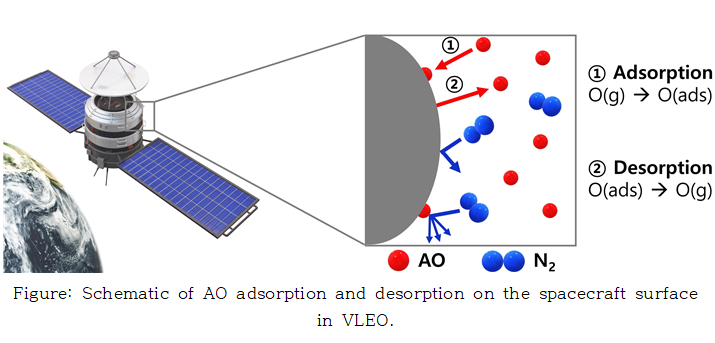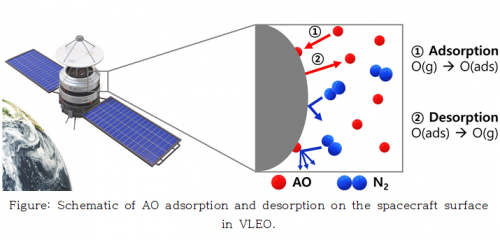Major research outcome
- M.S. Candidate Songhyun Huh and Prof. Eunji Jun, Gas-surface interaction method which can reflect effect of atomic oxygen adsorption in Very-Low-Earth-Orbit
- 관리자 |
- 2025-01-06 15:28:55|
- 207
- 2025-01-06 15:28:55|
Very-Low-Earth-Orbit (VLEO) is defined as the region below 500 km altitude, attracting attention due to its advantages of lower launch costs, higher observation resolution, and communication efficiency. However, the VLEO environment presents challenges due to residual atmospheric drag, which significantly affects satellite orbits and determines mission lifetimes. Drag is determined by gas-surface interactions, which are affected by atomic oxygen (AO), a predominant atmospheric constituent in VLEO. High chemical reactivity of AO leads to surface chemical reactions, particularly adsorption, when colliding with spacecraft surfaces. Therefore, gas-surface interaction methods accounting for AO adsorption are needed for accurate prediction of gas-surface interactions in VLEO.
In the KAIST Non-equilibrium Gas and Plasma Dynamics Laboratory (KNGPDL, advisor: Prof. Eunji Jun) of the Department of Aerospace Engineering, novel gas-surface interaction method called “AO adsorption adaptive α method (AAA method)” is developed. This method is capable of accounting for the effects of AO adsorption. The AAA method utilizes the Direct Simulation Monte Carlo (DSMC) method to calculate the amount of AO adsorbed on the spacecraft surface. It then assigns an energy accommodation coefficient, a parameter determining gas-surface interactions, to reflect the local effect of adsorbed AO. The AAA method has demonstrated high accuracy in predicting changes in the energy accommodation coefficient resulting from AO adsorption. Furthermore, DSMC simulations using the AAA method have shown that a significant proportion of the drag acting on VLEO spacecraft is attributable to AO adsorption, underscoring the importance of considering AO effects in drag analysis for VLEO missions.
This work has been published in the international journal Aerospace Science and Technology (Volume 158) (IF: 5.0, JCR top 10% in Aerospace Engineering). First author: Songhyun Huh, M.S. candidate.
Title: Drag Analysis Incorporating Atomic Oxygen Adsorption in Very-Low-Earth-Orbit
DOI: https://doi.org/10.1016/j.ast.2024.109900

In the KAIST Non-equilibrium Gas and Plasma Dynamics Laboratory (KNGPDL, advisor: Prof. Eunji Jun) of the Department of Aerospace Engineering, novel gas-surface interaction method called “AO adsorption adaptive α method (AAA method)” is developed. This method is capable of accounting for the effects of AO adsorption. The AAA method utilizes the Direct Simulation Monte Carlo (DSMC) method to calculate the amount of AO adsorbed on the spacecraft surface. It then assigns an energy accommodation coefficient, a parameter determining gas-surface interactions, to reflect the local effect of adsorbed AO. The AAA method has demonstrated high accuracy in predicting changes in the energy accommodation coefficient resulting from AO adsorption. Furthermore, DSMC simulations using the AAA method have shown that a significant proportion of the drag acting on VLEO spacecraft is attributable to AO adsorption, underscoring the importance of considering AO effects in drag analysis for VLEO missions.
This work has been published in the international journal Aerospace Science and Technology (Volume 158) (IF: 5.0, JCR top 10% in Aerospace Engineering). First author: Songhyun Huh, M.S. candidate.
Title: Drag Analysis Incorporating Atomic Oxygen Adsorption in Very-Low-Earth-Orbit
DOI: https://doi.org/10.1016/j.ast.2024.109900

| Attach File |
|---|


